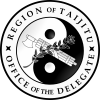Difference between revisions of "Template:This month's featured article/August, 2010"
| Line 1: | Line 1: | ||
[[image:DelegateSeal.png|100px|left|the Seal of the Delegate of Taijitu.]] | [[image:DelegateSeal.png|100px|left|the Seal of the Delegate of Taijitu.]] | ||
| − | The '''[[Delegate]]''' is the | + | The '''[[Delegate]]''' of Taijitu is the head of government and ''de facto'' head of state of Taijitu. They are charged under the region's constitution with upholding both the constitution itself and any other laws. They are assisted in this task by an appointed cabinet of ministers. The constitution also provides that the delegate is the commander in chief of the armed forces and may negotiate treaties with foreign powers, veto legislation of the [[Senate]] and nominate justices to the [[Court]]. Unique among government offices, the delegate also holds power in-game, voting on behalf of the region in World Assembly resolutions. They are elected every seven weeks alongside the Senate by an instant runoff vote on the same ticket as a vice delegate who assumes the delegate's office if they become unable to serve. The most recent elections were held in June of 2010. |
| − | The delegate | + | The delegate serves as both the head of government and head of state of Taijitu. Only the first of these roles is stated explicitly in the [[Constitution of Taijitu]]. The second is primarily a matter of tradition. As the head of government, the delegate is for both enforcing the law and administering government programs. They are formally aided in these responsibilities by an appointed cabinet of ministers, and informally by their vice delegate. The constitution also confers important powers in the sphere of foreign policy on the delegate. They are the commander in chief of the armed forces and may negotiate with foreign governments. Both of these powers are subject to checks by the Senate. |
| − | + | The delegate is elected by a popular vote of all citizens of Taijitu along with a vice delegate of their choice. Elections are held every seven weeks. Any citizen is eligible to run for the office and there is no limit to the number of terms a single person may serve as delegate. The winner of these elections are determined using an instant runoff vote. There are no by-elections. In the event that the delegate can no longer serve, their vice delegate assumes the office. | |
Latest revision as of 21:27, 1 August 2010
The Delegate of Taijitu is the head of government and de facto head of state of Taijitu. They are charged under the region's constitution with upholding both the constitution itself and any other laws. They are assisted in this task by an appointed cabinet of ministers. The constitution also provides that the delegate is the commander in chief of the armed forces and may negotiate treaties with foreign powers, veto legislation of the Senate and nominate justices to the Court. Unique among government offices, the delegate also holds power in-game, voting on behalf of the region in World Assembly resolutions. They are elected every seven weeks alongside the Senate by an instant runoff vote on the same ticket as a vice delegate who assumes the delegate's office if they become unable to serve. The most recent elections were held in June of 2010.
The delegate serves as both the head of government and head of state of Taijitu. Only the first of these roles is stated explicitly in the Constitution of Taijitu. The second is primarily a matter of tradition. As the head of government, the delegate is for both enforcing the law and administering government programs. They are formally aided in these responsibilities by an appointed cabinet of ministers, and informally by their vice delegate. The constitution also confers important powers in the sphere of foreign policy on the delegate. They are the commander in chief of the armed forces and may negotiate with foreign governments. Both of these powers are subject to checks by the Senate.
The delegate is elected by a popular vote of all citizens of Taijitu along with a vice delegate of their choice. Elections are held every seven weeks. Any citizen is eligible to run for the office and there is no limit to the number of terms a single person may serve as delegate. The winner of these elections are determined using an instant runoff vote. There are no by-elections. In the event that the delegate can no longer serve, their vice delegate assumes the office.
